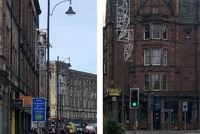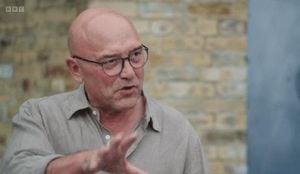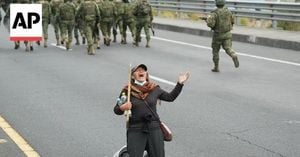On Wednesday, October 8, 2025, the city of Edinburgh found itself at the heart of a growing movement to confront poverty and housing injustice, as campaigners, council leaders, and residents united for Challenge Poverty Week. The Grassmarket Community Project, tucked into the city’s historic center, became the stage for the third annual End Poverty Edinburgh conference—a gathering that drew together people with lived experience of poverty, advocacy groups, and local officials. Their message was clear: poverty in Scotland’s capital is a crisis that demands urgent, collective action.
According to figures highlighted at the event and reported by the BBC, around 80,000 residents in Edinburgh are living in relative poverty. That’s roughly one in every five children in the city—an unsettling statistic in a place renowned for its culture and prosperity. The conference, organized by the End Poverty Edinburgh citizen group, was part of a broader campaign to challenge the stigma and systemic barriers that keep so many families on the edge.
Caroline Cawley, a member of End Poverty Edinburgh and someone who has experienced poverty firsthand, spoke passionately about the need for hope and action. “This is our third annual conference, and we wanted to use this day as an opportunity to highlight the injustices facing marginalised groups, who are more likely to experience poverty in Scotland,” she told attendees. “Poverty and uncertainty for these groups is not getting better and many people are starting to lose hope. This is the worst thing to lose as hope is the last thing to go. As a group of Edinburgh residents with lived experience of poverty, we’ll continue to use Challenge Poverty Week to call for change and solutions, including greater poverty prevention in the city.”
Edinburgh’s citywide commitment to tackling poverty has accelerated in recent years, particularly through the End Poverty Edinburgh Action Plan. This includes addressing the city’s ongoing Housing Emergency—a term that’s become all too familiar as the cost of living rises and affordable, accessible housing remains out of reach for many. The council has also launched the Regenerative Futures Fund, aimed at empowering local communities to lead poverty prevention efforts and drive meaningful change. The hope is that by putting resources and decision-making power into the hands of those most affected, solutions will be more effective and lasting.
Council Leader Jane Meagher, speaking at the event, underscored the scale of the challenge. “In Edinburgh around 80,000 residents are struggling to make ends meet, with one in five children living in relative poverty. We must continue to do everything in our power to end poverty in Edinburgh,” she said. “I’m proud of the positive work which is already being done to combat the causes of inequality in the city, and this annual conference highlights the incredible efforts of our third sector, council officers, and city partners to make life better for thousands of people across the city. Without this progress, these statistics would be even more stark. We can’t address poverty alone and this Challenge Poverty Week, we’re uniting for change, highlighting the injustice of poverty in our communities.”
But the fight against poverty isn’t just about statistics or policy plans—it’s about people like Ema Nyx. Ema, a 36-year-old council tenant in the Wester Hailes neighborhood, has spent 12 years in a flat that simply doesn’t meet her needs. With limited mobility and often reliant on a wheelchair, Ema’s daily life is a struggle. Her flat lacks an adapted shower and toilet, forcing her to take a bus for an hour each way to a private gym just to bathe. “I don’t need much, I need a room to wash in, to be able to get in and around my kitchen to cook, to get in and out of my property without steps, and be able to easily get a bus to get to my appointments,” Ema explained to the Local Democracy Reporting Service. “And yet, here I am, lifting a 30 kilogram wheelchair up and down steps to go to a council office where they’re just like, ‘oh, this is my first time hearing of it’. Having done everything I’m supposed to – it’s just knackering. How am I supposed to keep up with medical stuff and everyday life?”
Her story is not unique, but it is particularly stark. After years of promises that her flat would be adapted, the council eventually said it couldn’t be done. Ema then spent five years trying to get “gold priority” status on EdIndex, the city’s priority council housing list for those who need accessible homes. In June 2025, she was finally awarded that status, with a promise that she’d be moved into a suitable flat by September 10. That deadline has come and gone, and while two accessible flats were offered, neither met her needs—one had a stair lift that would make carrying groceries upstairs nearly impossible. Meanwhile, her current flat suffers from mold and damp, a serious issue given her suppressed immune system. The council offered to make minor repairs, but only if she temporarily moved out, which she declined.
“We’re here doing everything we’re supposed to do, and they still couldn’t meet [the deadline]. How organised do you have to be to get an accessible home?” Ema asked. “I need to get into a home that can meet my basic needs. You know, home, somewhere that you’re meant to be able to rest and recover. Nothing is going to be difficult between now and getting in that front door and getting to bed or getting to sit on the sofa or whatever. And yet, everything is difficult as soon as I get through the door – but getting through that door is also difficult.”
On October 8, the same day as the anti-poverty conference, tenants’ union Living Rent held a demonstration outside a council office in Wester Hailes, calling for urgent action in Ema’s case. Labour councillor and Housing convener Lezley Marion Cameron acknowledged the situation: “We understand Ema’s frustration and will continue to support her to find a home that meets her housing needs as swiftly as possible. We can confirm that the property she’s currently living in has been inspected, and minor works are required which the council will carry out. However, Ema has advised officers she would prefer to remain there until the council finds her a permanent home rather than move to a temporary property.”
Edinburgh’s commitment to tackling poverty is being tested not just by the numbers, but by the lived realities of its most vulnerable residents. As part of Challenge Poverty Week, the council is rolling out poverty stigma training to its employees, aiming to increase awareness and help people access the support they need. A pop-up at Gilmerton Library is offering information on benefits, skills-building, money advice, and links to the community food pantry—practical steps to reach those at risk.
The October conference is just the first of three major poverty-focused events in the city this month. On October 25, the Scotland Demands Better rally, led by the Scottish Poverty Alliance, will take place in Edinburgh, followed by a public event from the Edinburgh Poverty Commission on October 31 to launch their latest findings on ending poverty in the city. Peter Kelly of The Poverty Alliance put it succinctly: “In a rich country like ours, poverty is an injustice that weakens us all as a society. But we can solve it. We can redesign our economy to make sure people have incomes that are adequate enough to live a life with freedom and dignity.”
For now, the fight continues. The hope, as Caroline Cawley and so many others have voiced, is that Edinburgh’s growing movement will not only keep hope alive but turn it into real, lasting change for those who need it most.





